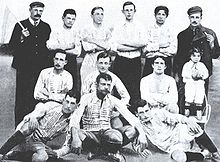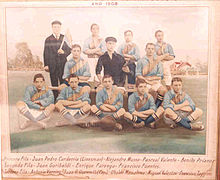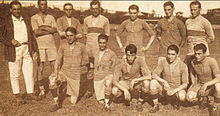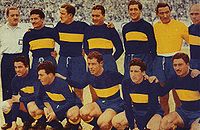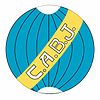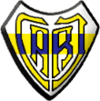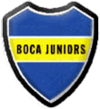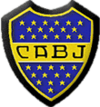- Boca Juniors
-
Boca Juniors 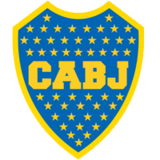
Full name Club Atlético Boca Juniors Nickname(s) Los Xeneizes (The Genoese)
La Mitad Más Uno (Half Plus One)
Azul y Oro (The Blue and Gold)
El Rey de Copas (The King of Cups)
Rey Mundial De Clubes (World King of Clubs)Founded April 3, 1905 Ground Estadio Alberto J. Armando
(La Bombonera),
La Boca, Buenos Aires
(Capacity: 49,000)Chairman Jorge Amor Ameal Manager Julio César Falcioni League Primera División 2011 Clausura 7th Website Club home page Home coloursAway coloursClub Atlético Boca Juniors is an Argentine sports club based in La Boca, neighborhood of Buenos Aires. It is best known for its professional football team, which currently plays in the Primera División.
Boca Juniors is one of the most successful clubs in Argentina and in the world, having won 47 official titles at the national and international level. They almost won another in 2004, but they were defeated by Colombian side Once Caldas. Domestically, they have twenty-three league titles; they last won the 2008 Apertura tournament. Internationally, the team has won eighteen international titles,[1] a record shared with A.C. Milan. Their international trophy haul includes six Copa Libertadores,[2] four Recopa Sudamericana, three world club titles (Intercontinental Cup),[3] two Copa Sudamericana, one Copa Oro, one Supercopa Sudamericana, and one Supercopa Masters. Boca Juniors is also one of only eight teams to have won CONMEBOL's treble (the others being Olimpia, São Paulo, Independiente, Vélez Sársfield, Cruzeiro, Internacional and LDU Quito). Their success usually has Boca ranked among the IFFHS's Club World Ranking Top 25, which they have reached the top position six times (mostly during the coaching tenure of Carlos Bianchi).[4] Boca was also named by the IFFHS as the top South American club of the 1st decade of the 21st century (2001–2010).[5]
The club was founded on April 3, 1905 by five Italian immigrants. The club currently has a fierce rivalry with River Plate, also from Buenos Aires. Matches between the two clubs are known as the Superclásico and is one of the most heated rivalries in Argentina and the world as both clubs are the two most popular in the country. Boca's home stadium is Estadio Alberto J. Armando, which is colloquially known as La Bombonera. The youth academy has produced many Argentine internationals such as Nicolás Burdisso, Carlos Tévez and Fernando Gago, who have played or are playing for top European clubs.
In addition to football, Boca Juniors also has a professional basketball team and amateur teams in futsal, basketball, martial arts (judo, taekwondo, karate), wrestling, volleyball, gymnastics (artistic, rhythmic, aerobic), swimming, and weightlifting.
Contents
History
Foundation
On April 3, 1905, five Italian boys met in order to found a club. The house where the meeting was arranged was Esteban Baglietto's and the other four people who attended were Alfredo Scarpatti, Santiago Sana and brothers Juan and Teodoro Farenga. After some hours of discussions Baglietto's father threw the boys out of the house and they had to continue with the project in the Plaza Solís, which is recognized today as the place where Boca Juniors was finally founded.[6] [7]
Other important founders members include Arturo Penney, Marcelino Vergara, Luis Cerezo, Adolfo Taggio, Giovanelli, Donato Abbatángelo, Bertolini.[8] The use of English language in football team names was commonplace, as British railway workers had originally introduced association football into Argentina.[9]
Amateur era (1908–1930)
On 1908, the affiliation request sent by Boca (through Juan Farenga and Bartolomé Gariboldi) to the Argentine Football Association was accepted. Boca Juniors' first stadium was located in the Isla Demarchi. Juan Brichetto was one of the many fans who donated money to finish the construction.
Boca Juniors debut as part of the Association was in the Segunda de Ascenso division, playing a match against Club Belgrano that Boca won 3–1. The squad finished in the first place (among eight teams) and qualified for the next stage, the semifinals, which Boca played against Racing Club: Boca was defeated by 1–0 and was eliminated.
The 1908 team roster was: De Los Santos, Vergara, Cerezo, Ryan, A. Penney, Priano, Penney, Moltedo, Pratt, J. Farenga, Eloiso and Pastor. That year Boca played the Copa Bullrich and was eliminated after being defeated by Atlanta by 5–0
On 1910 Boca plays the semifinals against Racing Club and lost by 2–1, also losing not only the match but the promotion to Argentine Primera División. The team roster was formed by Bellocq, Cerezo, Garibaldi, Piralini, Vergara, Bonatti, Spinelli, Arturo Penney, Pastor, Taggino, Giovanelli and Moltedo. The following year, Boca is eliminated in the first round, in spite of the team players were the same than 1910.
Promotion to Primera División
On 1913 Boca obtained the promotion to Primera División that the team had longed for many years. This was possible due to the Asociación Argentina de Fútbol decided to increase the number of teams in the league from 6 to 15.[10] The other teams that went to Primera were Ferro Carril Oeste, Platense, Banfield, Olivos, Comercio, Ferro Carril Sud and Riachuelo. Boca Juniors' roster was: Virtú Bidone, Garibaldi, Lamelas, Martínez, Elena, Valentini, P. Calomino, González, Leal, Taggino, Abbatángelo, Bruzzan, Giraldi, Romano, Vergara and Bertolini.
The first title
On January 20, 1920, Boca Juniors reached its first championship (which belong to 1919 season).[11] after defeating Sportivo de Almagro by 4–0. The match was played in Boca stadium, located in Ministro Brin and Senquel streets. Boca Juniors line-up was: Tesoriere; Cortella, Ortega, López, Busso, Elli; Calomino, Bozzo, Garasini, Martín, Miranda. Miranda and Martín were the scorers of the match (2 goals each).[12] Boca Juniors obtained a new title the following year (corresponding to the 1920 season but played in 1921), after a victory of 2–0 against Banfield. The next championship achieved was in 1923 and it took 4 matches to decide which team (Boca or Huracán) would be the champion, so Boca won the first match but was defeated in the 2nd game; the 3rd match finished in a tie and a 4th game had to be played (at Sportivo Barracas stadium, on April 27, 1924), finally won by Boca 2–0 obtaining a new title. Both goals were scored by Garasini.
Boca was the unbeaten champion of the 1924 season, winning 18 matches over 19 disputed. The team finished with a total of goals scored of 67 (an average of 3.52 per game) and only received 8.
Champion of honour
In 1925 Boca made its first trip to Europe to play many friendly matches there (more specifically in Spain, Germany and France). Boca disputed a total of 19 games, winning 15 of them. Some of the rivals defeated were Real Madrid, Celta de Vigo and Deportivo La Coruña. On June 28, 1926, in a meeting held at the Association Argentina de Football, Boca Juniors was declared "Campeón de Honor" (Champion of Honour) of 1925 season, and each member of the team received a commemorative medal. The players were: Tesoriere, Bidoglio, Mutis, Tarascone, Busso, Elli, Médici, Garasini, Antraygues, Cerroti, Pertini and Posso.[13]
Last titles in the amateurism
Boca Juniors won a new championship in 1926, having finished unbeaten (same as 1924 season) after 17 games played. Boca Juniors and Independiente were to play off for unified title following the unification of the two leagues (Asociación Argentina de Football and Asociación Amateurs de Football), but after their match (played on Feb 20, 1927) was halted due to a spectator invasion, and a replay on Mar 3, 1927, finished 0–0, no further match was played due to the start of the new season.[14]
The last amateur championship was obtained in 1930 (which ended on March 22, 1931) when Boca defeated Atlanta 4–1. This was its 6th. title in the amateur era and the line-up that attended the match was: Mena, Bidoglio, Mutis; Moreyras, Pedemonte, P. Suárez; Penella, Kuko, Tarascone, Cherro, Alberino.
During the amateur era, Boca won a total of six championships (1919, 1920, 1923, 1924, 1926, and 1930).[15]
Professional era
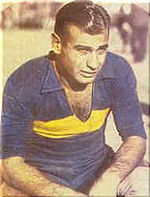 Francisco Varallo, 3rd. all-time top scorer.
Francisco Varallo, 3rd. all-time top scorer.
The Beginnings
With the introduction of professional football in Argentina, Boca won its first title in 1931, defeating its main rival, River Plate by 3-0 in the last fixture. Boca totalized 50 points, with a total of 22 victories, 6 ties and 6 games lost. [16]
In 1934 Boca won its second professional title, although they lost 7 matches and received 62 goals. The key was in the power of the forwards, who totalized 101 goals. Boca Juniors became the first team which scored more than 100 goals in a tournament. Boca achieved a new title in 1935, becoming the first bi-champion of the professional era. The team also scored 100 goals and only received 29.
During the decade of the 1930s, some footballers such as Juan Yustrich (nicknamed "El Pez Volador"), Pedro Arico Suárez, Delfín Benítez Cáceres, Domingo Tarasconi, Roberto Cherro and Francisco Varallo were not only big stars but Boca Juniors great idols.
Decade of the 1940s
Boca won 3 titles more in the 1940s, the same as the last decade. The first was obtained in 1940 tournament, the same year that Boca Juniors Stadium was inaugurated. The key match was against Independiente, which Boca won 5-2 and proclaimed new champion. Boca totalized 24 games won, 7 ties and 3 lost.
In 1941 Boca would be (for the second time in its history) bi-champion, after winning 3-0 its last match in River Plate stadium (because the Bombonera had been temporarily closed by hooliganism incidents). The record was 19 won, 8 tied and 3 lost. The line-up is still remembered as one of the greatest Boca all-time teams: Vacca, Marante, Valussi, Sosa, Lazzatti, Pescia, Boyé, Corcuera, Sarlanga, Varela, Sánchez.
In 1944 Boca remained unbeated for 26 consecutive matches, which was a record in the professional era until Racing broke this landmark when remained 39 matches without being defeated in 1966. The last fixture Boca won over Racing 3-0, again in River stadium and Boca was proclaimed champion again.
On the other hand, Boca was near to being relegated to Segunda División in 1949 but could keep its place in Primera with a victory over Lanús in the last fixture.
The 1950s and the Glorious 1960s
In 1954 Boca won its first title after 9 unsuccessful years. The key match was against Huracán, which Boca defeated 3-1 obtaining the championship. The top scorer was José "Pepino" Borello (19 goals). Other outstanding player was Julio Musimessi, nicknamed "El arquero cantor" ("The singer goalkeeper").
Boca finished 8th in 1959 although the team won the two "Superclásicos" (5-1 and 3-2 after a partial lost of 0-2).
On December 9, 1962, Boca won a legendary match defeating River Plate 1-0, with the highlight of goalkeeper Antonio Roma stopping a penalty shot by Delem when lasted only 6 minutes to the end of the match. Boca finally won its first title of the decade in the next fixture with a great victory (4-0) over Estudiantes de La Plata, becoming new champion. During the 1960s, Boca Juniors totalized 5 championships.
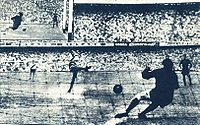 Antonio Roma stopping the penalty shot to Delem in 1962.
Antonio Roma stopping the penalty shot to Delem in 1962.
The following title obtained was in 1964, with Antonio Roma as a decisive player again due to the fact he kept the goal structure undefeated during 742 minutes, receiving only one goal in 14 matches. In 1965 Boca became bi-champion for the 3rd. time in professional era. The key matches were the victory over River Plate (2-1) and Atlanta in the last fixture.
In the 1968 Metropolitano championship during a Superclásico that ended 0-0, 71 Boca Juniors' supporters died squashed to a exit door of the River Plate stadium, which remained closed at the moment of the fans left the stadium. This is still remembered as The Tragedy of the Door #12' (La Tragedia de la Puerta 12)
In 1969 an official tournament named Copa Argentina was disputed. Teams included those playing the Metropolitano and others outside Buenos Aires. Boca Juniors proclaimed champion after defeating Atlanta by goal average (the matches ended 3-1 and 0-1). Boca Juniors played a total of 10 matches, winning 7, with 1 tied and only 1 lost.
During the same year Boca played its last match of the Nacional championship visiting River Plate at the Monumental. The match ended 2-2 (Norberto Madurga scored twice) proclaming Boca as the new champion. The Xeneizes totalized 29 points, winning 13, with 3 tied and only 1 defeat and were coached by Alfredo Di Stéfano.
The second "golden age": the 1970s
In 1970 Boca won another title defeating Rosario Central in the final match of the Nacional tournament. In 1976 Juan Carlos Lorenzo arrived to the club. He would became one of the most successful coaches in the history of Boca Juniors, winning 5 official titles within 3 years. First of them was the 1976 Metropolitano, which Boca obtained after defeating Unión de Santa Fe 2-0.
The following tournament (1976 Nacional) Boca played a historic final match against River Plate, winning 1-0 through a free-kick goal scored by Rubén Suñé. That championship qualified Boca Juniors to play the 1977 Copa Libertadores, having reached the final match against Cruzeiro. After a victory 1-0 in Buenos Aires and a defeat in Belo Horizonte by the same score, it was necessary to play a third game, hosted in Montevideo where Boca finally obtained the Libertadores for the first time, after a dramatic penalty shoot-out where Hugo Gatti stopped the last shot by brazilian player Vanderley.
The next title Boca won was the Intercontinental Cup, facing Borussia Mönchengladbach: the first match played in Buenos Aires ended 2-2 but Boca won the second game 3-0 in Karlsruhe, Germany and brought the trophy back to Argentina.
Boca Juniors obtained its second Copa Libertadores after defeating Deportivo Cali (coached by Carlos Bilardo) 4-0 in the Bombonera (the first match played in Colombia had finished 0-0).
1980s/90s
During the decade of the 1980s Boca only won one title (in 1981). The highlight was the acquisition of Diego Maradona, who came to the club along with Miguel Brindisi, Osvaldo Escudero, Marcelo Trobbiani and former player Silvio Marzolini as coach. Boca was proclaimed champion of the 1981 Metropolitano after an 1-1 facing Racing Club. Boca totalized 50 points, 20 wins, 10 tied and 4 lost.
In 1984 Boca was near to a financial collapse, almost going bankrupt. The same year the squad was hardly defeated at the hands of FC Barcelona, losing 1-9 in a Copa Joan Gamper match. Antonio Alegre was elected president and under his command Boca settled 153 lawsuits early in his tenure by mortgaging his business assets for US$250,000, and by lending Boca Juniors US$800,000. These and other measures enabled Alegre to recover the club's finances. Boca also sold the land acquired earlier for US$21 million. The club's improved finances led to its revival, and Boca emerged victorious in a number of coveted tournaments in subsequent years, including the 1989 Supercopa Sudamericana, the 1990 Recopa Sudamericana, the 1992 Torneo Apertura, the Copa Master of 1992, and the Copa de Oro Nicolás Leoz in 1992.
Kit and badge
The original jersey colour was pink, but this was quickly abandoned for thin black-and-white vertical stripes.[17] Legend has it that in 1906, Boca played another team that used this strip to decide who would get to keep it. Boca lost, and decided to adopt the colors of the flag of the first boat to sail into the port at La Boca. This proved to be the 4146 ton freighter "Drottning Sophia", a Swedish vessel sailing from Copenhagen.[18] As a result, the yellow and blue of the Swedish flag were adopted as the new team colours.[19] The first version had a yellow diagonal band, which was later changed to a horizontal stripe.[20]
Kit evolution and rare kits
- First kit evolution [21]
1905 1905 1905–06 1907–13 1913–96,1999-present - Rare models and special editions
1996–97 home (1) 1998–99 home 1998 Copa Mercosur 2000–01 Mercosur 2005 100th anniv.(2) 2006–07 away 2010 105th. anniv.(3) (1) For the first time since 1913, two white stripes were added to jersey.
(2) This model was worn just for 2 matches during 2005 Torneo de Verano (Summer Tournament) in order to commemorate the 100th anniversary of the institution.
(3) This model was worn just for 2 matches versus River Plate in 2010 Torneo de VeranoKit manufacturer and Shirt sponsors
Period Kit Manufacturer Shirt Sponsors 1980–80 Adidas None 1983 Vinos Maravilla 1984 Dekalb 1985 None 1986–88 Fate 1989–92 FIAT 1992–95 Olan Parmalat 1995–96 Olan / Topper Quilmes 1996–01 Nike 2001–03 Pepsi 2003–04 Pepsi & Goodyear 2004–05 Red Megatone & Goodyear 2006 Megatone & Goodyear 2007–09 Megatone & Unicef 2009–11 LG & Total 2011– BBVA Banco Francés & Total[22][23] Badge
The club has had five different designs for its crest during its history, although its outline has remained unchanged throughout its history. In 1955, laurel leaves were added to celebrate the club's 50th anniversary, and the colours were changed to match those on the team's jersey.[24] In 1970, one star was added to the badge for each title won[25] domestically (at the top, above the initials) and internationally (at the bottom). A new star was added to the corresponding section whenever Boca wins a title. To the delight of fans, the crest had to be modified several times in recent years. In 2007, the club changed its crest to include only 3 stars, one for each Intercontinental Cup / Club world title[citation needed].
Stadium
Main article: Estadio Alberto J. ArmandoBoca Juniors used several locations before settling on their current ground on Brandsen. Their first ground was in la Dársena Sur but it was vacated in 1907 as it failed to meet the minimum league requirements. They then used three grounds in the Isla Demarchi area between 1908 and 1912.[26] Between 1914 and 1915, the club moved away from La Boca for the only time in its history, moving to Wilde in the Avellaneda Partido of the Buenos Aires Province but a relatively poor season[27] and poor attendances in 1915 forced them to move back to La Boca.
On 25 May 1916, Boca opened their new stadium at the intersection of Calle Ministro Brin and Calle Senguel, playing there until 1924 when they moved to their current location on Calle Brandsen and Calle Del Crucero.
Construction work on the concrete structure of their current stadium started in 1938 under the supervision of Engineer José L.Delpini. Boca played their home matches in the Ferrocarril Oeste ground in Caballito until it was completed in 1940.[26] A third level was added in 1953, giving the ground its nickname La Bombonera ('The Chocolate Box').[28] The stand opposite the Casa Amarilla railway platforms remained mostly undeveloped until 1996, when it was upgraded with new balconies and VIP boxes. Three sides of the Bombonera are made up of traditional sloping stadium stands, but the fourth side had to be built vertically, with several seating areas stacked one on top of the other, to stay within the stadium's property. La Bombonera is renowned for vibrating when fans start to jump in rhythm; in particular, the unique vertical side will sway slightly, leading to the phrase, "the Bombonera does not tremble. It beats." (La Bombonera no tiembla. Late.)[citation needed]
The Bombonera currently has a capacity of around 49,000. The club's popularity make tickets hard to come by, especially for the Superclasico game against River Plate.[29] There are further improvements planned for the stadium, including measures to ease crowd congestion, use of new technology and improved corporate facilities.[30]
- Dársena Sud : 1908–12
- Wilde : 1914–15
- Brins y Sengüel : 1916–24
- Brandsen : 1924–
Supporters
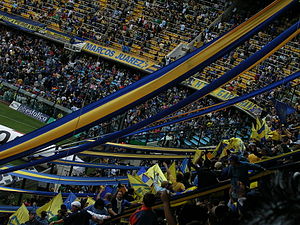 Barra Brava of "La 12" in La Bombonera
Barra Brava of "La 12" in La Bombonera
Boca Juniors is traditionally regarded as the club of Argentina's working class, in contrast with the supposedly more upper-class base of cross-town arch rival Club Atlético River Plate.[31]
Boca Juniors claims to be the club of "half plus one" (la mitad más uno) of Argentina's population, but a 2006 survey placed its following at 40%,[32] still the largest share. They have the highest number of fans, as judged by percentage in their country.
The Boca-River Superclásico rivalry is one of the most thrilling derbies in the world.[33] Out of their 327 previous meetings, Boca have won 121, River 105 and there have been 101 draws.[34] After each match (except draws), street signs cover Buenos Aires at fans' own expense, "ribbing" the losing side with humorous posters. This has become part of Buenos Aires culture ever since a Boca winning streak in the 1990s.
In 1975, a film (La Raulito) was made about the life of Mary Esher Duffau, known as La Raulito, a well-known Boca Juniors fan. She died at the age of 74 on 30 April 2008, the same day Boca Juniors played a Copa Libertadores match against Brazilian club, Cruzeiro Esporte Clube with the players and fans observing a minute's silence in her memory.[35]
Nicknames
Boca fans are known as los xeneizes (the Genoese) after the Genoese immigrants who founded the team and lived in La Boca in the early 20th century.[36]
Many rival fans in Argentina refer to the Boca Juniors' fans as Los Bosteros (the manure handlers), originating from the horse manure used in the brick factory which occupied the ground where La Bombonera stands. Originally an insult used by rivals, Boca fans are now proud of it.[37]
Reflecting the team's colors, Boca's shirt is also called la azul y oro (the blue and gold).[38]
There is also a society which dedicates all of its activities to supporting the team known as la número 12 or la doce (player number doce or 12, meaning "the 12th player")[39]
The naming of “La 12″ (the twelfth player), by which Boca Juniors' fans became known, dates back to the year 1925, during the European tour they made that year. At that time, the team was accompanied by a Boca fan called Victoriano Caffarena, who belonged to a wealthy family and funded part of the tour. During that tour he helped the team in everything establishing a strong relationship with the players, so they named him “Player No. 12″. When they returned to Argentina, Caffarena was as well known as the players themselves. Nowadays, this nickname is used primarily to name their group of supporters, known as “La 12″.[40]
International
Peñas (fan clubs) exist in a number of Argentine cities and abroad in countries such as Russia, Ukraine,[41] Spain,[42] Israel[43] and Japan.[44]
Boca Juniors are particularly popular in Japan because of the club's success in recent years at the Intercontinental Cup held in Japan. All over the world, fans are drawn to Boca by the club's international titles, and by the success of Boca players who went on to play in European football such as Hugo Ibarra, Rodolfo Arruabarrena, Diego Cagna, Enzo Ferrero, Roberto Abbondanzieri, Nicolás Burdisso, Fernando Gago, Diego Maradona, Claudio Caniggia, Gabriel Batistuta, Juan Román Riquelme and Carlos Tévez.[citation needed]
Boca have fans throughout Latin America and also in parts of the United States where there has been Latin immigration and where in July 2007, after the club had toured pre-season, it was reported that the club were considering the possibility of creating a Boca Juniors USA team to compete in Major League Soccer (MLS) with New York City, Miami, Los Angeles and Arizona mentioned as possible locations.[45]
Rivalries
Main article: SuperclásicoBoca Juniors has had a long standing rivalry with River Plate. The Superclásico is known worldwide as one of world football's fiercest and most important rivalries.[46] It is particularly noted for the passion of the fans, the stands of both teams feature fireworks, coloured confetti, flags and rolls of paper. Both sets of supporters sing passionate songs (often based on popular Argentine rock band tunes) against their rivals, and the stadiums are known to bounce with the simultaneous jumping of the fans. Sometimes the games have been known to end in riots between the hardest supporters of both sides or against the police. The English newspaper The Observer put the Superclásico at the top of their list of 50 sporting things you must do before you die.[47]
The two clubs both have origins in the poor riverside area of Buenos Aires known as La Boca. River however moved to the more affluent district of Núñez in the north of the city in 1923. Boca Juniors and River Plate have played 327 games all time against each other, with Boca winning 121, River 105 and 101 times the games ended in a draw. In the Professional Era the two clubs have played 184 games with Boca winning 68, River 61 and 55 draws.[48]
This intense rivalry has not stopped players from playing for both clubs, most notably Jose Manuel Moreno, Hugo Orlando Gatti, Alberto Tarantini, Oscar Ruggeri, Julio Olarticoechea, Carlos Tapia, Gabriel Batistuta and Claudio Caniggia.
Players
For a list of all former and current Boca Juniors players with a Wikipedia article, see Category:Boca Juniors footballers.Current squad
Note: Flags indicate national team as has been defined under FIFA eligibility rules. Players may hold more than one non-FIFA nationality. Current squad of Boca Juniors as of August 13, 2011 ()
Sources: Argentine SoccerNo. Position Player 1  ARG
ARGGK Agustín Orión 2  ARG
ARGDF Rolando Schiavi 3  ARG
ARGDF Clemente Rodríguez 4  ARG
ARGDF Franco Sosa 5  ARG
ARGMF Sebastián Battaglia 6  ARG
ARGDF Matías Caruzzo 7  ARG
ARGFW Pablo Mouche 8  ARG
ARGMF Diego Rivero 9  ARG
ARGFW Lucas Viatri 10  ARG
ARGMF Juan Román Riquelme 11  ARG
ARGMF Walter Erviti 12  ARG
ARGGK Sebastián D'Angelo 13  URU
URUGK Sebastián Sosa 14  ARG
ARGDF Enzo Ruiz 15  ARG
ARGMF Nicolás Colazo 16  ARG
ARGMF Jesús Méndez No. Position Player 17  ARG
ARGFW Nicolás Blandi 18  ARG
ARGMF Leandro Somoza 19  ARG
ARGMF Leandro Gracián 20  ARG
ARGFW Darío Cvitanich 21  ARG
ARGMF Cristian Chávez 22  ARG
ARGMF Cristian Erbes 23  ARG
ARGDF Facundo Roncaglia 24  ARG
ARGFW Sergio Araujo 25  ARG
ARGMF Matías Giménez 26  ARG
ARGDF Gastón Sauro 27  PAR
PARFW Orlando Gaona Lugo 28  ARG
ARGMF Juan Sánchez Miño 29  ARG
ARGDF Juan Insaurralde 31  ARG
ARGFW Franco Fragapane 32  ARG
ARGMF Leandro Paredes Manager: Julio César Falcioni
Reserves and Academy
For the reserve and academy squads, see Boca Juniors Reserves and Academy
Records
Top 10 scorers of all time
See also: Boca Juniors top scorers Martín Palermo is Boca Juniors' all-time top goalscorer.
Martín Palermo is Boca Juniors' all-time top goalscorer.
 Martín Palermo (1997–01; 2004–2011) 236 goals
Martín Palermo (1997–01; 2004–2011) 236 goals Roberto Cherro (1926–38) 221 goals
Roberto Cherro (1926–38) 221 goals Francisco Varallo (1931–39) 194 goals
Francisco Varallo (1931–39) 194 goals Domingo Tarasconi (1922–32) 193 goals
Domingo Tarasconi (1922–32) 193 goals Jaime Sarlanga (1940–48) 128 goals
Jaime Sarlanga (1940–48) 128 goals Mario Boyé (1941–49; 1955) 123 goals
Mario Boyé (1941–49; 1955) 123 goals Delfín Benítez Cáceres (1932–38) 115 goals
Delfín Benítez Cáceres (1932–38) 115 goals Pío Corcuera (1941–48) 98 goals
Pío Corcuera (1941–48) 98 goals Pedro Calomino (1911–13; 1915–24) 96 goals
Pedro Calomino (1911–13; 1915–24) 96 goals Sergio Martínez (1992–97) 86 goals
Sergio Martínez (1992–97) 86 goals
 Guillermo Barros Schelotto (1997–07) 86 goals
Guillermo Barros Schelotto (1997–07) 86 goals
Last updated on: June 20, 2011 – Top 10 all time scorers at historiadeboca.com.ar
Top 10 most appearances of all time
 Roberto Mouzo has made the highest number of appearances for Boca Juniors (426).
Roberto Mouzo has made the highest number of appearances for Boca Juniors (426).
 Roberto Mouzo (1971–84) 426 matches
Roberto Mouzo (1971–84) 426 matches Hugo Gatti (1976–88) 417 matches
Hugo Gatti (1976–88) 417 matches Silvio Marzolini (1960–72) 407 matches
Silvio Marzolini (1960–72) 407 matches Martín Palermo (1997–01; 2004–2011) 404 matches
Martín Palermo (1997–01; 2004–2011) 404 matches Carlos Navarro Montoya (1988–96) 400 matches
Carlos Navarro Montoya (1988–96) 400 matches Antonio Rattín (1956–70) 382 matches
Antonio Rattín (1956–70) 382 matches Ernesto Lazzatti (1934–47) 379 matches
Ernesto Lazzatti (1934–47) 379 matches Rubén Suñé (1967–72; 1976–80) 377 matches
Rubén Suñé (1967–72; 1976–80) 377 matches Natalio Pescia (1942–56) 365 matches
Natalio Pescia (1942–56) 365 matches Roberto Abbondanzieri (1997–06; 2009–10) 345 matches
Roberto Abbondanzieri (1997–06; 2009–10) 345 matches
Last updated on: June 20, 2011 – Top 10 most appearances of all time at historiadeboca.com.ar
Notable players
- This section lists players who have appeared in least 100 matches[49] or scored at least 35 goals[50] for the club.
- Amateur Era (1905–31)
- Máximo Pieralini (1909–18) [51]
 Francisco Taggino (1910–15) [52]
Francisco Taggino (1910–15) [52] Pedro Calomino (1911–13; 1915–24)
Pedro Calomino (1911–13; 1915–24) Enrique Bertolini (1912–23) [53]
Enrique Bertolini (1912–23) [53] Alfredo Elli (1916–28) [54]
Alfredo Elli (1916–28) [54] Alfredo Garasini (1916–28) [55]
Alfredo Garasini (1916–28) [55] Américo Tesoriere (1916–27)
Américo Tesoriere (1916–27)
 Pablo Bozzo (1918–23) [56]
Pablo Bozzo (1918–23) [56] Mario Busso (1918–27) [57]
Mario Busso (1918–27) [57] Ramón Muttis (1923–32)
Ramón Muttis (1923–32) Ludovico Bidoglio (1922–31)
Ludovico Bidoglio (1922–31) Ángel Médici (1922–31)
Ángel Médici (1922–31) Domingo Tarasconi (1922–32)
Domingo Tarasconi (1922–32) Roberto Cherro (1926–35)
Roberto Cherro (1926–35)
 Mario Evaristo (1926–31)
Mario Evaristo (1926–31) Estaban Kuko (1926–33) [58]
Estaban Kuko (1926–33) [58] Gerardo Moreyras (1927–33) [59]
Gerardo Moreyras (1927–33) [59] Donato Penella (1928–32) [60]
Donato Penella (1928–32) [60] Antonio Alberino (1929–34)
Antonio Alberino (1929–34) Pedro Arico Suárez (1929–42)
Pedro Arico Suárez (1929–42)
- Professional Era (1931–present)
-
- 1930s – 1970s
 Francisco Varallo (1931–39)
Francisco Varallo (1931–39) Delfín Benítez Cáceres (1932–38)
Delfín Benítez Cáceres (1932–38) Juan Yustrich (1932–37)
Juan Yustrich (1932–37) José Manuel Marante (1934–38; 1940–50) [61]
José Manuel Marante (1934–38; 1940–50) [61] Ernesto Lazzatti (1934–47)
Ernesto Lazzatti (1934–47) Víctor Valussi (1935–36; 1938–45)
Víctor Valussi (1935–36; 1938–45) Juan Alberto Estrada (1938–43)
Juan Alberto Estrada (1938–43) Claudio Vacca (1938–40; 1942–50) [62]
Claudio Vacca (1938–40; 1942–50) [62] Segundo Gregorio Ibáñez (1939–42) [63]
Segundo Gregorio Ibáñez (1939–42) [63] Jaime Sarlanga (1940–48)
Jaime Sarlanga (1940–48) Mario Boyé (1941–49; 1955)
Mario Boyé (1941–49; 1955) Pío Corcuera (1941–48)
Pío Corcuera (1941–48) Carlos "Lucho" Sosa (1941–51)
Carlos "Lucho" Sosa (1941–51) Natalio Pescia (1942–56)
Natalio Pescia (1942–56) Severino Varela (1943–45)
Severino Varela (1943–45) Obdulio Diano (1944–53) [64]
Obdulio Diano (1944–53) [64] Rodolfo Dezorzi (1945–48) [65]
Rodolfo Dezorzi (1945–48) [65] Héctor Raúl Otero (1948–56) [66]
Héctor Raúl Otero (1948–56) [66]
 Marcos Busico (1949–54) [67]
Marcos Busico (1949–54) [67] Herminio Antonio "Pierino" González (1949–54; 1956–59) [68]
Herminio Antonio "Pierino" González (1949–54; 1956–59) [68] Juan Carlos "Comisario" Colman (1950–57) [69]
Juan Carlos "Comisario" Colman (1950–57) [69] José "Pepino" Borello (1951–58) [70]
José "Pepino" Borello (1951–58) [70] Federico Roberto Edwards (1951–59) [71]
Federico Roberto Edwards (1951–59) [71] Juan Francisco Lombardo (1952–60)
Juan Francisco Lombardo (1952–60) Eliseo Mouriño (1953–60)
Eliseo Mouriño (1953–60) Julio Musimessi (1953–59)
Julio Musimessi (1953–59) Antonio Rattín (1956–70)
Antonio Rattín (1956–70) Juan José Rodríguez (1956–62; 1964) [72]
Juan José Rodríguez (1956–62; 1964) [72] Osvaldo Nardiello (1958–62) [73]
Osvaldo Nardiello (1958–62) [73] Ernesto Grillo (1960–66)
Ernesto Grillo (1960–66) Silvio Marzolini (1960–72)
Silvio Marzolini (1960–72) Antonio Roma (1960–72)
Antonio Roma (1960–72) Paulo Valentim (1960–64)
Paulo Valentim (1960–64) Orlando (1961–65)
Orlando (1961–65) Alberto Mario "Gonzalito" González (1962–68) [74]
Alberto Mario "Gonzalito" González (1962–68) [74] Norberto Menéndez (1962–67)
Norberto Menéndez (1962–67)
 José María Silvero (1962–66)
José María Silvero (1962–66) Carmelo Simeone (1962–67)
Carmelo Simeone (1962–67) Ángel Clemente Rojas (1963–71)
Ángel Clemente Rojas (1963–71) Alcides Silveira (1963–68) [75]
Alcides Silveira (1963–68) [75] Oscar Pianetti (1964–71) [76]
Oscar Pianetti (1964–71) [76] Alfredo "El Tanque" Rojas (1964–68)
Alfredo "El Tanque" Rojas (1964–68) Norberto Rubén Madurga (1965–71) [77]
Norberto Rubén Madurga (1965–71) [77] Nicolás Novello (1966–72; 1974) [78]
Nicolás Novello (1966–72; 1974) [78] Armando Ovide (1966–76) [79]
Armando Ovide (1966–76) [79] Ramón Héctor Ponce (1966–74) [80]
Ramón Héctor Ponce (1966–74) [80] Miguel Nicolau (1967–72; 1974–75) [81]
Miguel Nicolau (1967–72; 1974–75) [81] Rubén Omar Sánchez (1967–75) [82]
Rubén Omar Sánchez (1967–75) [82] Rubén Suñé (1967–72; 1976–80)
Rubén Suñé (1967–72; 1976–80) Julio Meléndez (1968–72)
Julio Meléndez (1968–72) Roberto Rogel (1968–75) [83]
Roberto Rogel (1968–75) [83] Jorge Coch (1969–71; 1980) [84]
Jorge Coch (1969–71; 1980) [84] Orlando José Medina (1969–72) [85]
Orlando José Medina (1969–72) [85] Rubén Peracca (1969–73) [86]
Rubén Peracca (1969–73) [86]
-
- 1970s – 1990s
 Hugo Curioni (1970–73)
Hugo Curioni (1970–73) Enzo Ferrero (1971–75)
Enzo Ferrero (1971–75) Roberto Mouzo (1971–84)
Roberto Mouzo (1971–84) Osvaldo Potente (1971–75; 1979–80)
Osvaldo Potente (1971–75; 1979–80) Jorge "Chino" Benítez (1973–83)
Jorge "Chino" Benítez (1973–83) Vicente "Tano" Pernía (1973–81)
Vicente "Tano" Pernía (1973–81) Alberto Tarantini (1973–77)
Alberto Tarantini (1973–77) Marcelo Trobbiani (1973–76; 1981–82)
Marcelo Trobbiani (1973–76; 1981–82) Carlos García Cambón (1974–77)
Carlos García Cambón (1974–77) Abel Alves (1975–83) [87]
Abel Alves (1975–83) [87] Darío Felman (1975–78)
Darío Felman (1975–78) Hugo Gatti (1976–88)
Hugo Gatti (1976–88) Ernesto Mastrangelo (1976–81)
Ernesto Mastrangelo (1976–81) Jorge Ribolzi (1976–81) [88]
Jorge Ribolzi (1976–81) [88]
 Francisco Sá (1976–81)
Francisco Sá (1976–81) José María Suárez (1976–82) [89]
José María Suárez (1976–82) [89] Carlos Veglio (1976–78; 1980)
Carlos Veglio (1976–78; 1980) Mario Zanabria (1976–80)
Mario Zanabria (1976–80) Hugo Alves (1977–84) [90]
Hugo Alves (1977–84) [90] Hugo Perotti (1977–82; 1982–84) [91]
Hugo Perotti (1977–82; 1982–84) [91] Carlos Héctor Córdoba (1978–84) [92]
Carlos Héctor Córdoba (1978–84) [92] Ricardo Gareca (1978–80; 1982–84)
Ricardo Gareca (1978–80; 1982–84) Oscar Ruggeri (1980–84)
Oscar Ruggeri (1980–84) Ariel Krasouski (1981–85; 1986–88) [93]
Ariel Krasouski (1981–85; 1986–88) [93] Diego Maradona (1981–82; 1995–97)
Diego Maradona (1981–82; 1995–97) Roberto Passucci (1981–86) [94]
Roberto Passucci (1981–86) [94] Fabián Carrizo (1983–90; 1994–96) [95]
Fabián Carrizo (1983–90; 1994–96) [95] Ivar Gerardo Stafuza (1983–91) [96]
Ivar Gerardo Stafuza (1983–91) [96]
 Luis Abramovich (1985–92)
Luis Abramovich (1985–92) Alfredo Graciani (1985–91; 1993–94)
Alfredo Graciani (1985–91; 1993–94) Enrique Hrabina (1985–91) [97]
Enrique Hrabina (1985–91) [97] Carlos Daniel Tapia (1985–94)
Carlos Daniel Tapia (1985–94) Jorge Comas (1986–89)
Jorge Comas (1986–89) José Luis Cuciuffo (1987–90)
José Luis Cuciuffo (1987–90) Diego Latorre (1987–92; 1996–98)
Diego Latorre (1987–92; 1996–98) José Luis Villareal (1987–93) [98]
José Luis Villareal (1987–93) [98] Carlos Navarro Montoya (1988–96)
Carlos Navarro Montoya (1988–96) Walter Pico (1988–92; 1994–96) [99]
Walter Pico (1988–92; 1994–96) [99] Juan Simón (1988–94)
Juan Simón (1988–94) Diego Soñora (1988–95)
Diego Soñora (1988–95) Blas Giunta (1989–93; 1995–97)
Blas Giunta (1989–93; 1995–97) Víctor Hugo Marchesini (1989–93) [100]
Víctor Hugo Marchesini (1989–93) [100]
-
- 1990s – 2000s
Coaches
Main article: List of Boca Juniors head coachesBoca's two most successful coaches were Juan Carlos Lorenzo (1976~79, 1987), and Carlos Bianchi, (1998–2002, 2003~04). Toto Lorenzo won five titles with the team, including the Libertadores Cup in 1977 and 1978, the Intercontinental Cup in 1977, and the Metropolitano and Nacional in 1976. Bianchi won nine, including Aperturas in 1998, 2000 and 2003, the 1999 Clausura, the Libertadores Cup in 2000, 2001, and 2003, and the Intercontinental Cup in 2000 and 2003.
On 22 August 2006, it was announced that Ricardo Lavolpe would take over the post of coach on September 15, replacing Alfio Basile, who had been selected to manage Argentina National Football Team. Lavolpe failed to continue Basile's chain of success, losing the 2006 Apertura championship in spite of a 4 points advantage with only two rounds to go.
Miguel Angel Russo was hired as Lavolpe's replacement. Boca took second place to San Lorenzo de Almagro in the 2007 Clausura tournament, but went on to win the Copa Libertadores with a 5-0 overall rout of Brazilian Grêmio.
Carlos Ischia was hired after Miguel Angel Russo left to go be San Lorenzo de Almagro's Coach.
Julio Cesar Falcioni is the current head coach of Boca Juniors.homma
Institutional
Executive Board 2008–2011[102]
- President: Jorge Amor Ameal
- 2nd Vice-president: José Beraldi
- 3rd Vice-president: Juan Carlos Crespi
- Secretary: Oscar A. Vicente
Chairmen
Main article: List of Boca Juniors chairmenPedro Pompilio was the club's last elected chairman, succeeding Ing. Mauricio Macri (current Head of Government of the Autonomous City of Buenos Aires). Pompilio died during his presidency on October 30, 2008 due to heart attack. His family asked not to send flowers to his funeral and donate money to UNICEF instead. He was 58 years old at that time.[103] He was married and had two children.[104]
Jorge Amor Ameal, 1st vice president during Pedro Pompilio's direction, is the new Boca Juniors president.[105] Boca's most successful president was Mauricio Macri (1996–2008). During his era, the club has won most of its international titles.Honors
Boca Juniors is one of the most successful teams in Argentine football. They have won six amateur title in Argentina's amateur era. In the professional era, they have won 23 league titles, second only to River Plate. In South American and international club football, Boca has won 18 titles, a world record they share with A.C. Milan.
National
- Amateur Era (6): AAF 1919, AAF 1920, AAF 1923, AAF 1924, AAF 1926, 1930
- Champion of Honor (1): 1925[106]
- Professional era
- Primera División (23): 1931, 1934, 1935, 1940, 1943, 1944, 1954, 1962, 1964, 1965, 1969 Nacional, 1970 Nacional, 1976 Metropolitano, 1976 Nacional, 1981 Metropolitano, 1992 Apertura, 1998 Apertura, 1999 Clausura, 2000 Apertura, 2003 Apertura, 2005 Apertura, 2006 Clausura, 2008 Apertura
- Copa Argentina (1): 1969
International
- Copa Libertadores (6): 1977, 1978, 2000, 2001, 2003, 2007
- Copa Sudamericana (2): 2004, 2005
- Recopa Sudamericana (4): 1990, 2005, 2006, 2008
- Supercopa Sudamericana (1): 1989
- Intercontinental Cup (3): 1977, 2000, 2003
- Supercopa Masters (1): 1992
- Copa de Oro (1): 1993
Other
- Copa de Competencia Jockey Club (2): 1919, 1925
- Copa Ibarguren (5): 1919, 1923, 1924, 1940, 1944
- Tie Cup (1): 1919
- Copa de Honor Cousenier (1): 1920
- Copa Estímulo (1): 1926[107]
- Copa de Competencia Británica George VI (1): 1946[108]
- Copa de Confraternidad Escobar - Gerona (1): 1946[109]
- Copa San Martín de Tours (5): 1964, 1969, 1974, 1976, 1991[110]
- Copa Estado de Israel (1): 2006[111]
Records
- Boca Juniors and Milan both hold a world record 18 official international titles.
- Boca Juniors has the most official titles (domestic and international) for an Argentine football club with 41 titles in the professional era (48 including amateur titles).
- Boca Juniors were awarded the title "Campeón de Honor" (Honour Champion) in 1925, due to a highly successful tour through Europe in which the club played Real Madrid, Atlético Madrid and Real Sociedad, as well as German and French teams, with an impressive record of 15 wins, one draw and three defeats. This title was declared official by the Argentine Football Association, thereby increasing the total number of amateur and professional titles to 49 (31 domestic and 18 international titles).
- 40 consecutive Primera División matches unbeaten - an Argentine record: from 5 May 1998 to 2 June 1999, with 29 victories and 11 draws.[112]
- Three times winner of the Intercontinental Cup (now replaced by FIFA Club World Cup), a record tied with Peñarol, Nacional, Milan and Real Madrid.
Products and services
Boca Juniors has expanded its activity beyond sport, providing its fans with a number of other products and services.
In 2003, it became the fifth football club in the world to open its own TV channel. Boca TV broadcasts 24 hours a day, featuring sports programs and talk shows.
There is a line of Boca coffins available for dead fans,[113] as well as an official Boca Juniors cemetery.[114]
Boca has its own fleet of taxis operating in Buenos Aires.[115]
The club also sells its own brand of wine, called Boca Wine.[116]
Other sports
Basketball
Main article: Boca Juniors (basketball)The Boca Juniors basketball team has won the Argentine league three times (1996/97, 2003/04, 2006/07), five Argentine Cups (Copa Argentina 2002, 2003, 2004, 2005, 2006), the Argentine Top 4 (2004), and three South American Club Championships (2004, 2005, 2006).[117][118] It also reached the 2004–05 national finals (losing to Ben Hur). Their home arena is the Estadio Luis Conde, better known as La Bombonerita (small Bombonera).
Volleyball
Boca Juniors has a professional volleyball team that won the Metropolitan championship in 1991, 1992 and 1996, and achieved the second place in the 1996/97 A1 season. Because of a lack of sponsors, the team was disbanded, but later it was reincorporated through the coaching of former Boca player Marcelo Gigante; after playing in the second division, it returned to the A1 league in 2005.
Women's football
The Boca Juniors women's football team plays in the Campeonato de Fútbol Femenino and have won the championship a record 19 times of which 10 were in succession from the 2003 Apertura to the 2008 Clausura.[119]
Honours
- Campeonato de Fútbol Femenino (19): 1992, 1998, 1999, 2000*, 2001 Apertura, 2002 Clausura, 2003 Apertura, 2004 Clausura, 2004 Apertura, 2005 Clausura, 2005 Apertura, 2006 Clausura, 2006 Apertura, 2007 Clausura, 2007 Apertura, 2008 Clausura, 2009 Apertura, 2010 Apertura and 2011 Clausura
- * Unbeaten champion
Though the club has not yet won any international competition, it secured the third place at the 2010 Copa Libertadores de Fútbol Femenino.
Other
Starting 2005, the Argentine Turismo Carretera stock-car competition league spun off the Top Race V6 category, in which teams are sponsored by football teams. Veteran race pilots Ortelli and Bessone and former Boca player Vicente Pernía drive for the Boca team; Ortelli finally won the first Top Race V6 championship for Boca Juniors.
In Futsal, Boca has won 6 Championships: 1992, 1993, Clausura 1997, Apertura 1998, Clausura 2003 (Men), and and 2004 (women).
Boca representatives also compete in other disciplines such as judo, karate, taekwondo, wrestling, weight lifting and gymnastics.[120]
There is an Argentine steakhouse in Queens, NYC which is a Boca Juniors theme restaurant. http://www.bocajuniorsrestaurant.com/
References
- ^ CONMEBOL Article
- ^ RSSSF Copa Libertadores
- ^ RSSSF Copa Intercontinental
- ^ IFFHS Club World rankings statistics
- ^ "South America’s Club of the 1st Decade of the 21st Century (2001-2010)". IFFHS.de. http://www.iffhs.de/?3d0a843ccf413ecf05ffcc8129dad5105fdcdc3bfcdc0aec70aeedbc83d4d41b. Retrieved 15 February 2011.
- ^ Historia de Boca Juniors
- ^ BBC Sport article
- ^ "Historia de Boca Juniors". Informexeneize.com. http://www.informexeneize.com.ar/historia_1.htm. Retrieved 8 June 2010.
- ^ "Boca Juniors club history". Boca Juniors.com. http://www.bocajuniors.com.ar/en-us/the-club. Retrieved 8 June 2010.
- ^ RSSSF Argentine divisional movements
- ^ [1] 1919 Argentina season and results
- ^ Amateurismo - Informe Xeneize
- ^ [2]
- ^ Argentina: List of Champions and Runners-Up - RSSSF
- ^ RSSSF Argentine divisional movements
- ^ RSSSF List of Argentine champions and runners up
- ^ Solodeportes centenery edition of the shirt
- ^ Flags of the World article
- ^ Guardian Article
- ^ Boca Juniors official website: kits
- ^ Historia de los colores de Boca - sitio oficial
- ^ http://playfutbol.infobae.com/notas/605433-Como-vamos-a-querer-jugar-contra-River-si-ellos-estan-en-la-B
- ^ http://www.impulsonegocios.com/contenidos/2011/09/14/Editorial_15477.php
- ^ Boca Juniors official website: crests
- ^ Boca Verense site
- ^ a b La Pasion Boca-Boca and their stadiums (Spanish)
- ^ RSSSF Argentina 1915
- ^ Midfield Dynamo stadium profiles
- ^ Independent article
- ^ Boca Juniors official website
- ^ Tim Vickery Column BBC Football
- ^ "Se cae un mito: la hinchada de Boca no suma la mitad más uno del país" - InfoBae (Spanish)
- ^ World derbies: Boca Juniors v River Plate - BBC news.
- ^ ESPN Deportes statistics
- ^ "Adiós, "Raulito"" (in Spanish). infobae.com. 2008-05-01. http://www.infobae.com/notas/nota.php?Idx=377770&IdxSeccion=0. Retrieved 2008-05-27.
- ^ Flags of the World article. The word xeneize is Genoese dialect for the Ligurian word zeneize, which means "Genoese".
- ^ Taringa: see comment by senomar1234 23 June 2007 18:44:25
- ^ Clarín Article (Spanish)
- ^ canaltrans.com article (Spanish)
- ^ See La 12 and La Bombonera section
- ^ Russian-Ukrainian fan-site Narod.ru (Russian)
- ^ Bocajuniors.com.ar: Listado de Peñas(Spanish)
- ^ Labaton, Dana; Szerman, Luli (March, 2003). "Club Atlético Boca Juniors - Los bosteros de la rivera" (in Spanish). Piedra Libre. Archived from the original on 2008-03-15. http://web.archive.org/web/20080315194104/http://www.piedralibre.co.il/revista/2003/03/2003_03_equipo_boca.asp. Retrieved 2008-06-21.
- ^ "Cómo viajó "La 12" a Japón y logró ingresar al estadio olímpico de Tokio" (in Spanish). MDZ Online. 2007-12-12. http://www.mdzol.com/mdz/nota/21635/. Retrieved 2008-06-21.
- ^ "Boca Juniors Considers Starting an MLS Expansion Team". theoffside.com. 2007-07-31. http://www.theoffside.com/south-america/boca-juniors-mulls-starting-an-mls-expansion-team.html. Retrieved 2008-06-21.
- ^ BBC Academy, famous football derbies
- ^ 50 sporting things you must do before you die
- ^ Superclásico - TyC Sports(Spanish)
- ^ "Los jugadores que más partidos jugaron (Top 150)". historiadeboca.com.ar. http://www.historiadeboca.com.ar/lostop.asp?CantTop=150&Eleccion=0&CodRiv=0&OpTipoTorneos=6. Retrieved 1 March 2011.
- ^ "Los jugadores con más goles marcados (Top 50)". historiadeboca.com.ar. http://www.historiadeboca.com.ar/lostop.asp?CantTop=50&Eleccion=1&CodRiv=0&OpTipoTorneos=6. Retrieved 1 March 2011.
- ^ "Pieralini, Máximo". historiadeboca.com.ar. http://www.historiadeboca.com.ar/jugadores.asp?CodJug=7038&AnioInicial=1905&AnioFinal=2010&OpTipoTorneos=6&CodRiv=0&CodCan=0&Condicion=0. Retrieved 26 October 2010.
- ^ "Taggino, Francisco". historiadeboca.com.ar. http://www.historiadeboca.com.ar/jugadores.asp?CodJug=7031&AnioInicial=1905&AnioFinal=2010&OpTipoTorneos=6&CodRiv=0&CodCan=0&Condicion=0. Retrieved 3 October 2010.
- ^ "Bertolini, Enrique". historiadeboca.com.ar. http://www.historiadeboca.com.ar/jugadores.asp?CodJug=7065&AnioInicial=1905&AnioFinal=2010&OpTipoTorneos=6&CodRiv=0&CodCan=0&Condicion=0. Retrieved 3 October 2010.
- ^ "Elli, Alfredo". historiadeboca.com.ar. http://www.historiadeboca.com.ar/jugadores.asp?CodJug=7124&AnioInicial=1905&AnioFinal=2010&OpTipoTorneos=6&CodRiv=0&CodCan=0&Condicion=0. Retrieved 9 November 2010.
- ^ "Garasini, Alfredo". historiadeboca.com.ar. http://www.historiadeboca.com.ar/jugadores.asp?CodJug=7121&AnioInicial=1905&AnioFinal=2010&OpTipoTorneos=6&Buscar=Buscar&CodRiv=0&CodCan=0&condicion=0. Retrieved 27 September 2010.
- ^ "Bozzo, Pablo". historiadeboca.com.ar. http://www.historiadeboca.com.ar/jugadores.asp?CodJug=7147&AnioInicial=1905&AnioFinal=2010&OpTipoTorneos=6&CodRiv=0&CodCan=0&Condicion=0. Retrieved 9 November 2010.
- ^ "Busso, Mario". historiadeboca.com.ar. http://www.historiadeboca.com.ar/jugadores.asp?CodJug=7154&AnioInicial=1905&AnioFinal=2010&OpTipoTorneos=6&CodRiv=0&CodCan=0&Condicion=0. Retrieved 3 October 2010.
- ^ "Kuko, Esteban". historiadeboca.com.ar. http://www.historiadeboca.com.ar/jugadores.asp?CodJug=19&AnioInicial=1905&AnioFinal=2010&OpTipoTorneos=6&CodRiv=0&CodCan=0&Condicion=0. Retrieved 3 October 2010.
- ^ "Moreyras, Gerardo". historiadeboca.com.ar. http://www.historiadeboca.com.ar/jugadores.asp?CodJug=4&AnioInicial=1905&AnioFinal=2010&OpTipoTorneos=6&CodRiv=0&CodCan=0&Condicion=0. Retrieved 3 October 2010.
- ^ "Penella, Donato". historiadeboca.com.ar. http://www.historiadeboca.com.ar/jugadores.asp?CodJug=15&AnioInicial=1905&AnioFinal=2010&OpTipoTorneos=6&CodRiv=0&CodCan=0&Condicion=0. Retrieved 3 October 2010.
- ^ "Marante, José Manuel". historiadeboca.com.ar. http://www.historiadeboca.com.ar/jugadores.asp?CodJug=44&AnioInicial=1905&AnioFinal=2010&OpTipoTorneos=6&CodRiv=0&CodCan=0&Condicion=0. Retrieved 9 November 2010.
- ^ "Vacca, Claudio". historiadeboca.com.ar. http://www.historiadeboca.com.ar/jugadores.asp?CodJug=93&AnioInicial=1905&AnioFinal=2010&OpTipoTorneos=6&CodRiv=0&CodCan=0&Condicion=0. Retrieved 9 November 2010.
- ^ "Ibáñez, Segundo Gregorio". historiadeboca.com.ar. http://www.historiadeboca.com.ar/jugadores.asp?CodJug=98&AnioInicial=1905&AnioFinal=2010&OpTipoTorneos=6&CodRiv=0&CodCan=0&Condicion=0. Retrieved 2 October 2010.
- ^ "Diano, Obdulio". historiadeboca.com.ar. http://www.historiadeboca.com.ar/jugadores.asp?CodJug=140&AnioInicial=1905&AnioFinal=2010&OpTipoTorneos=6&CodRiv=0&CodCan=0&Condicion=0. Retrieved 3 October 2010.
- ^ "Dezorzi, Rodolfo Justo". historiadeboca.com.ar. http://www.historiadeboca.com.ar/jugadores.asp?CodJug=142&AnioInicial=1905&AnioFinal=2010&OpTipoTorneos=6&CodRiv=0&CodCan=0&Condicion=0. Retrieved 3 October 2010.
- ^ "Otero, Héctor Raúl". historiadeboca.com.ar. http://www.historiadeboca.com.ar/jugadores.asp?CodJug=177&AnioInicial=1905&AnioFinal=2010&OpTipoTorneos=6&CodRiv=0&CodCan=0&Condicion=0. Retrieved 3 October 2010.
- ^ "Busico, Marcos Ricardo". historiadeboca.com.ar. http://www.historiadeboca.com.ar/jugadores.asp?CodJug=201&AnioInicial=1905&AnioFinal=2010&OpTipoTorneos=6&CodRiv=0&CodCan=0&Condicion=0. Retrieved 3 October 2010.
- ^ "González, Herminio Antonio". historiadeboca.com.ar. http://www.historiadeboca.com.ar/jugadores.asp?CodJug=192&AnioInicial=1905&AnioFinal=2010&OpTipoTorneos=6&CodRiv=0&CodCan=0&Condicion=0. Retrieved 9 November 2010.
- ^ "Colman, Juan Carlos". historiadeboca.com.ar. http://www.historiadeboca.com.ar/jugadores.asp?CodJug=203&AnioInicial=1905&AnioFinal=2010&OpTipoTorneos=6&CodRiv=0&CodCan=0&Condicion=0. Retrieved 9 November 2010.
- ^ "Borello, José". historiadeboca.com.ar. http://www.historiadeboca.com.ar/jugadores.asp?CodJug=213&AnioInicial=1905&AnioFinal=2010&OpTipoTorneos=6&Buscar=Buscar&CodRiv=0&CodCan=0&condicion=0. Retrieved 27 September 2010.
- ^ "Edwards, Federeico Roberto". historiadeboca.com.ar. http://www.historiadeboca.com.ar/jugadores.asp?CodJug=216&AnioInicial=1905&AnioFinal=2010&OpTipoTorneos=6&CodRiv=0&CodCan=0&Condicion=0. Retrieved 8 November 2010.
- ^ "Rodríguez, Juan José". historiadeboca.com.ar. http://www.historiadeboca.com.ar/jugadores.asp?CodJug=261&AnioInicial=1905&AnioFinal=2010&OpTipoTorneos=6&Buscar=Buscar&CodRiv=0&CodCan=0&condicion=0. Retrieved 2 October 2010.
- ^ "Nardiello, Osvaldo". historiadeboca.com.ar. http://www.historiadeboca.com.ar/jugadores.asp?CodJug=281&AnioInicial=1905&AnioFinal=2010&OpTipoTorneos=6&CodRiv=0&CodCan=0&Condicion=0. Retrieved 3 October 2010.
- ^ "González, Alberto Mario". historiadeboca.com.ar. http://www.historiadeboca.com.ar/jugadores.asp?CodJug=318&AnioInicial=1905&AnioFinal=2010&OpTipoTorneos=6&CodRiv=0&CodCan=0&Condicion=0. Retrieved 9 November 2010.
- ^ "Silveira, Alcides Vicente". historiadeboca.com.ar. http://www.historiadeboca.com.ar/jugadores.asp?CodJug=329&AnioInicial=1905&AnioFinal=2010&OpTipoTorneos=6&CodRiv=0&CodCan=0&Condicion=0. Retrieved 3 October 2010.
- ^ "Pianetti, Oscar Antonio". historiadeboca.com.ar. http://www.historiadeboca.com.ar/jugadores.asp?CodJug=341&AnioInicial=1905&AnioFinal=2010&OpTipoTorneos=6&CodRiv=0&CodCan=0&Condicion=0. Retrieved 9 November 2010.
- ^ "Madurga, Norberto Rubén". historiadeboca.com.ar. http://www.historiadeboca.com.ar/jugadores.asp?CodJug=357&AnioInicial=1905&AnioFinal=2010&OpTipoTorneos=6&Buscar=Buscar&CodRiv=0&CodCan=0&condicion=0. Retrieved 27 September 2010.
- ^ "Novello, Nicolás". historiadeboca.com.ar. http://www.historiadeboca.com.ar/jugadores.asp?CodJug=358&AnioInicial=1905&AnioFinal=2010&OpTipoTorneos=6&CodRiv=0&CodCan=0&Condicion=0. Retrieved 3 October 2010.
- ^ "Ovide, Armando Oscar". historiadeboca.com.ar. http://www.historiadeboca.com.ar/jugadores.asp?CodJug=359&AnioInicial=1905&AnioFinal=2010&OpTipoTorneos=6&CodRiv=0&CodCan=0&Condicion=0. Retrieved 9 November 2010.
- ^ "Ponce, Ramón Héctor". historiadeboca.com.ar. http://www.historiadeboca.com.ar/jugadores.asp?CodJug=354&AnioInicial=1905&AnioFinal=2010&OpTipoTorneos=6&Buscar=Buscar&CodRiv=0&CodCan=0&condicion=0. Retrieved 27 September 2010.
- ^ "Nicolau, Miguel Alberto". historiadeboca.com.ar. http://www.historiadeboca.com.ar/jugadores.asp?CodJug=366&AnioInicial=1905&AnioFinal=2010&OpTipoTorneos=6&CodRiv=0&CodCan=0&Condicion=0. Retrieved 14 October 2010.
- ^ "Sánchez, Rubén Omar". historiadeboca.com.ar. http://www.historiadeboca.com.ar/jugadores.asp?CodJug=360&AnioInicial=1905&AnioFinal=2010&OpTipoTorneos=6&CodRiv=0&CodCan=0&Condicion=0. Retrieved 9 November 2010.
- ^ "Rogel, Roberto Domingo". historiadeboca.com.ar. http://www.historiadeboca.com.ar/jugadores.asp?CodJug=370&AnioInicial=1905&AnioFinal=2010&OpTipoTorneos=6&CodRiv=0&CodCan=0&Condicion=0. Retrieved 9 November 2010.
- ^ "Coch, Jorge". historiadeboca.com.ar. http://www.historiadeboca.com.ar/jugadores.asp?CodJug=379&AnioInicial=1905&AnioFinal=2010&OpTipoTorneos=6&CodRiv=0&CodCan=0&Condicion=0. Retrieved 3 October 2010.
- ^ "Medina, Orlando José". historiadeboca.com.ar. http://www.historiadeboca.com.ar/jugadores.asp?CodJug=381&AnioInicial=1905&AnioFinal=2010&OpTipoTorneos=6&CodRiv=0&CodCan=0&Condicion=0. Retrieved 20 October 2010.
- ^ "Peracca, Rubén". historiadeboca.com.ar. http://www.historiadeboca.com.ar/jugadores.asp?CodJug=383&AnioInicial=1905&AnioFinal=2010&OpTipoTorneos=6&CodRiv=0&CodCan=0&Condicion=0. Retrieved 3 October 2010.
- ^ "Alves, Abel Aníbal". historiadeboca.com.ar. http://www.historiadeboca.com.ar/jugadores.asp?CodJug=423&AnioInicial=1905&AnioFinal=2010&OpTipoTorneos=6&CodRiv=0&CodCan=0&Condicion=0. Retrieved 14 October 2010.
- ^ "Ribolzi, Jorge Daniel". historiadeboca.com.ar. http://www.historiadeboca.com.ar/jugadores.asp?CodJug=449&AnioInicial=1905&AnioFinal=2010&OpTipoTorneos=6&Buscar=Buscar&CodRiv=0&CodCan=0&condicion=0. Retrieved 27 September 2010.
- ^ "Suárez, José María". historiadeboca.com.ar. http://www.historiadeboca.com.ar/jugadores.asp?CodJug=457&AnioInicial=1905&AnioFinal=2010&OpTipoTorneos=6&CodRiv=0&CodCan=0&Condicion=0. Retrieved 3 October 2010.
- ^ "Alves, Hugo César". historiadeboca.com.ar. http://www.historiadeboca.com.ar/jugadores.asp?CodJug=464&AnioInicial=1905&AnioFinal=2010&OpTipoTorneos=6&CodRiv=0&CodCan=0&Condicion=0. Retrieved 20 October 2010.
- ^ "Perotti, Hugo Osmar". historiadeboca.com.ar. http://www.historiadeboca.com.ar/jugadores.asp?CodJug=474&AnioInicial=1905&AnioFinal=2010&OpTipoTorneos=6&CodRiv=0&CodCan=0&Condicion=0. Retrieved 20 October 2010.
- ^ "Córdoba, Carlos Héctor". historiadeboca.com.ar. http://www.historiadeboca.com.ar/jugadores.asp?CodJug=490&AnioInicial=1905&AnioFinal=2010&OpTipoTorneos=6&CodRiv=0&CodCan=0&Condicion=0. Retrieved 9 November 2010.
- ^ "Krasouski, Ariel José". historiadeboca.com.ar. http://www.historiadeboca.com.ar/jugadores.asp?CodJug=518&AnioInicial=1905&AnioFinal=2010&OpTipoTorneos=6&CodRiv=0&CodCan=0&Condicion=0. Retrieved 8 November 2010.
- ^ "Passucci, Roberto Aníbal". historiadeboca.com.ar. http://www.historiadeboca.com.ar/jugadores.asp?CodJug=516&AnioInicial=1905&AnioFinal=2010&OpTipoTorneos=6&CodRiv=0&CodCan=0&Condicion=0. Retrieved 9 November 2010.
- ^ "Carrizo, Fabián Gustavo". historiadeboca.com.ar. http://www.historiadeboca.com.ar/jugadores.asp?CodJug=560&AnioInicial=1905&AnioFinal=2010&OpTipoTorneos=6&CodRiv=0&CodCan=0&Condicion=0. Retrieved 9 November 2010.
- ^ "Stafuza, Ivar Gerardo". historiadeboca.com.ar. http://www.historiadeboca.com.ar/jugadores.asp?CodJug=538&AnioInicial=1905&AnioFinal=2010&OpTipoTorneos=6&CodRiv=0&CodCan=0&Condicion=0. Retrieved 9 November 2010.
- ^ "Hrabina, Enrique Oscar". historiadeboca.com.ar. http://www.historiadeboca.com.ar/jugadores.asp?CodJug=596&AnioInicial=1905&AnioFinal=2010&OpTipoTorneos=6&CodRiv=0&CodCan=0&Condicion=0. Retrieved 9 November 2010.
- ^ "Villareal, José Luis". historiadeboca.com.ar. http://www.historiadeboca.com.ar/jugadores.asp?CodJug=616&AnioInicial=1905&AnioFinal=2010&OpTipoTorneos=6&CodRiv=0&CodCan=0&Condicion=0. Retrieved 26 October 2010.
- ^ "Pico, Walter Reinaldo". historiadeboca.com.ar. http://www.historiadeboca.com.ar/jugadores.asp?CodJug=623&AnioInicial=1905&AnioFinal=2010&OpTipoTorneos=6&CodRiv=0&CodCan=0&Condicion=0. Retrieved 9 November 2010.
- ^ "Marchesini, Víctor Hugo". historiadeboca.com.ar. http://www.historiadeboca.com.ar/jugadores.asp?CodJug=634&AnioInicial=1905&AnioFinal=2010&OpTipoTorneos=6&CodRiv=0&CodCan=0&Condicion=0. Retrieved 3 October 2010.
- ^ "Moyá, Carlos Daniel". historiadeboca.com.ar. http://www.historiadeboca.com.ar/jugadores.asp?CodJug=642&AnioInicial=1905&AnioFinal=2010&OpTipoTorneos=6&CodRiv=0&CodCan=0&Condicion=0. Retrieved 3 October 2010.
- ^ Boca Juniors official website:Executive Board
- ^ "Falleció Pedro Pompilio"
- ^ "Murió el presidente de Boca, Pedro Pompilio, de una afección cardíaca"
- ^ "Ameal, the new president"
- ^ "Titles". Bocajuniors.com.ar. http://www.bocajuniors.com.ar/en-us/the-club/titles#amateur_1925. Retrieved 27 March 2011.
- ^ Ciullini, Pablo (September 24, 2009). "Argentina - Copa Estímulo Asociación Argentina - 1926". RSSSF. http://www.rsssf.com/tablesa/arg-estim26.html. Retrieved March 27, 2011.
- ^ Gorgazzi, Osvaldo José (March 16, 2001). "Argentina - Torneo Competencia "George VI" - 1946". RSSSF. http://www.rsssf.com/tablesa/arg-bri46.html. Retrieved March 27, 2011.
- ^ Gorgazzi, Osvaldo José (March 21, 2007). "Copa de Confraternidad Escobar - Gerona". RSSSF. http://www.rsssf.com/sacups/escobargerona.html. Retrieved March 27, 2011.
- ^ Gorgazzi, Osvaldo José (April 7, 2006). "Argentina - Copa San Martín de Tours, Patrono de Buenos Aires". RSSSF. http://www.rsssf.com/tablesa/argsanmartintours.html. Retrieved August 21, 2011.
- ^ Gorgazzi, Osvaldo José (May 11, 2006). "Argentina - Copa Estado de Israel". RSSSF. http://www.rsssf.com/tablesa/argisraelcup.html. Retrieved August 21, 2011.
- ^ "Boca Juniors' series of 40 matches unbeaten in the Primera División" - RSSSF
- ^ "Boca soccer fans' grave devotion" - BBC news
- ^ "Loyalty to Boca Juniors now truly cradle to grave" - International Herald Tribune
- ^ "Boca taxis sure to be shunned by River fans" - tiscali.news
- ^ "Boca fans - in life & death" - TheWorldGame
- ^ "Liga Nacional de Básquet - Boca Juniors" (in spanish). LNB.com.ar. http://www.lnb.com.ar/liga/bocajuniors.php. Retrieved 2009-09-17.
- ^ "El Básquetbol de Boca Juniors" (in spanish). Bocajuniors.com.ar. http://www.bocajuniors.com.ar/deportes/basquet/historia-en-la-liga-nacional. Retrieved 2009-09-17.
- ^ "SUPLE GOLAZO!". Diario El Heraldo. http://elheraldo.com.ar/ver_noticias.php?id_nota=38128. Retrieved 1 August 2010.
- ^ "Deportes". Boca Juniors official website. http://www.bocajuniors.com.ar/deportes/amateurs. Retrieved 1 August 2010.
External links
- Official website
- Boca Juniors results and statistics at RSSSF
- History of Boca Juniors at Historiadeboca.com.ar (Spanish)
- Player biographies at Informexeneize.com.ar (Spanish)
Club Atlético Boca Juniors Founded April 3, 1905Club Footballers (Top scorers) · Reserves and Academy · Head Coaches · ChairmenStadiums Rivals Key Personnel Chairman: Jorge Amor Ameal · Manager: Julio César FalcioniNational Titles (23) 1931 · 1934 · 1935 · 1940 · 1943 · 1944 · 1954 · 1962 · 1964 · 1965 · 1969 Nacional · 1970 Nacional · 1976 Metropolitano · 1976 Nacional · 1981 Metropolitano · 1992 Apertura · 1998 Apertura · 1999 Clausura · 2000 Apertura · 2003 Apertura · 2005 Apertura · 2006 Clausura · 2008 AperturaInternational Titles (18) 1977 Copa Libertadores · 1977 Intercontinental Cup · 1978 Copa Libertadores · 2000 Copa Libertadores · 1989 Supercopa Sudamericana · 1990 Recopa Sudamericana · 1992 Supercopa Masters · 1993 Copa de Oro · 2001 Copa Libertadores · 2000 Intercontinental Cup · 2003 Copa Libertadores · 2003 Intercontinental Cup · 2004 Copa Sudamericana · 2005 Copa Sudamericana · 2005 Recopa Sudamericana · 2006 Recopa Sudamericana · 2007 Copa Libertadores · 2008 Recopa SudamericanaSupporters Jugador N° 12Other Basketball · Boca Juniors-CarolinaWebsite: www.bocajuniors.com.arPrimera División 2011–12 teams All Boys · Argentinos Juniors · Arsenal · Banfield · Belgrano · Boca Juniors · Colón · Estudiantes (LP) · Godoy Cruz · Independiente · Lanús · Newell's Old Boys · Olimpo · Racing · Rafaela · San Lorenzo · San Martín (SJ) · Tigre · Unión · Vélez SársfieldFormer teams* River Plate · Rosario Central · Huracán · Gimnasia (La Plata) · Ferro Carril Oeste · Platense · Chacarita Juniors · Atlanta · Talleres (C) · Quilmes · Instituto · Deportivo Español · Gimnasia y Esgrima (J) · Racing (C) · San Martín (T) · Temperley · Mandiyú · Nueva Chicago · Talleres (RE) · Los Andes · Atlético Tucumán · Chaco For Ever · San Lorenzo (MdP) · San Martín (M) · Gimnasia y Esgrima (M) · Almagro · Gimnasia y Tiro · Sarmiento (J) · Central Norte · Independiente Rivadavia · Deportivo Armenio · Cipolletti · Juventud Antoniana · Kimberley · Altos Hornos Zapla · Atlético Ledesma · Desamparados · Central Córdoba (R) · Estudiantes (BA) · Guaraní Antonio Franco · Aldosivi · Huracán (C) · Huracán (CR)Seasons 1931 · 1932 · 1933 · 1934 · 1935 · 1936 · 1937 · 1938 · 1939 · 1940 · 1941 · 1942 · 1943 · 1944 · 1945 · 1946 · 1947 · 1948 · 1949 · 1950 · 1951 · 1952 · 1953 · 1954 · 1955 · 1956 · 1957 · 1958 · 1959 · 1960 · 1961 · 1962 · 1963 · 1964 · 1965 · 1966 · 1967 · 1968 · 1969 · 1970 · 1971 · 1972 · 1973 · 1974 · 1975 · 1976 · 1977 · 1978 · 1979 · 1980 · 1981 · 1982 · 1983 · 1984 · 1985 · 1985–86 · 1986–87 · 1987–88 · 1988–89 · 1989–90 · 1990–91 · 1991–92 · 1992–93 · 1993–94 · 1994–95 · 1995–96 · 1996–97 · 1997–98 · 1998–99 · 1999–2000 · 2000–01 · 2001–02 · 2002–03 · 2003–04 · 2004–05 · 2005–06 · 2006–07 · 2007–08 · 2008–09 · 2009–10 · 2010–11 · 2011–12Other articles Amateur era · All-time table · Promotion and Relegation statistics · Players · Records · Top scorers · Fillol Award- Former teams with 50 games or more played in the division, ordered by total number of games.
Categories:- Boca Juniors
- Multi-sport clubs
- Association football clubs established in 1905
- Argentine football clubs
- Argentine volleyball teams
Wikimedia Foundation. 2010.

